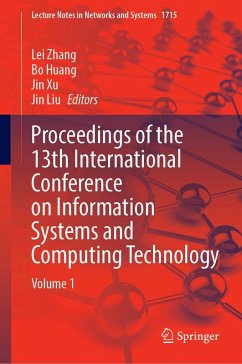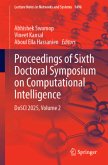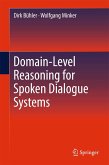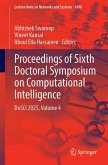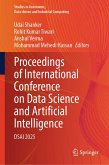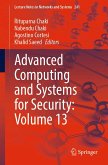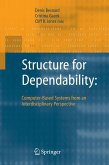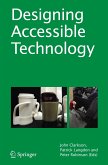Proceedings of the 13th International Conference on Information Systems and Computing Technology
Volume 1
Herausgegeben:Zhang, Lei; Huang, Bo; Xu, Jin; Liu, Jin
Proceedings of the 13th International Conference on Information Systems and Computing Technology
Volume 1
Herausgegeben:Zhang, Lei; Huang, Bo; Xu, Jin; Liu, Jin
- Gebundenes Buch
- Merkliste
- Auf die Merkliste
- Bewerten Bewerten
- Teilen
- Produkt teilen
- Produkterinnerung
- Produkterinnerung
This proceedings volume highlights the latest advancements in information systems and computing technology, showcasing innovative research and practical applications. Readers will find valuable insights into emerging technologies such as machine learning, deep learning, knowledge graphs, and UAV-based solutions. Topics include object detection, intelligent systems, federated learning, remote sensing, and next-generation network optimization, with a strong focus on real-world applications like medical imaging, transportation, and cybersecurity.
The volume provides readers with a…mehr
Andere Kunden interessierten sich auch für
![Proceedings of Sixth Doctoral Symposium on Computational Intelligence Proceedings of Sixth Doctoral Symposium on Computational Intelligence]() Proceedings of Sixth Doctoral Symposium on Computational Intelligence189,99 €
Proceedings of Sixth Doctoral Symposium on Computational Intelligence189,99 €![Domain-Level Reasoning for Spoken Dialogue Systems Domain-Level Reasoning for Spoken Dialogue Systems]() Dirk BühlerDomain-Level Reasoning for Spoken Dialogue Systems76,99 €
Dirk BühlerDomain-Level Reasoning for Spoken Dialogue Systems76,99 €![Proceedings of Sixth Doctoral Symposium on Computational Intelligence Proceedings of Sixth Doctoral Symposium on Computational Intelligence]() Proceedings of Sixth Doctoral Symposium on Computational Intelligence189,99 €
Proceedings of Sixth Doctoral Symposium on Computational Intelligence189,99 €![Proceedings of International Conference on Data Science and Artificial Intelligence Proceedings of International Conference on Data Science and Artificial Intelligence]() Proceedings of International Conference on Data Science and Artificial Intelligence208,99 €
Proceedings of International Conference on Data Science and Artificial Intelligence208,99 €![Advanced Computing and Systems for Security: Volume 13 Advanced Computing and Systems for Security: Volume 13]() Advanced Computing and Systems for Security: Volume 1391,99 €
Advanced Computing and Systems for Security: Volume 1391,99 €![Structure for Dependability: Computer-Based Systems from an Interdisciplinary Perspective Structure for Dependability: Computer-Based Systems from an Interdisciplinary Perspective]() Denis BesnardStructure for Dependability: Computer-Based Systems from an Interdisciplinary Perspective103,99 €
Denis BesnardStructure for Dependability: Computer-Based Systems from an Interdisciplinary Perspective103,99 €![Designing Accessible Technology Designing Accessible Technology]() Designing Accessible Technology204,99 €
Designing Accessible Technology204,99 €-
-
-
This proceedings volume highlights the latest advancements in information systems and computing technology, showcasing innovative research and practical applications. Readers will find valuable insights into emerging technologies such as machine learning, deep learning, knowledge graphs, and UAV-based solutions. Topics include object detection, intelligent systems, federated learning, remote sensing, and next-generation network optimization, with a strong focus on real-world applications like medical imaging, transportation, and cybersecurity.
The volume provides readers with a comprehensive understanding of cutting-edge techniques and their potential to address pressing challenges. Its interdisciplinary approach makes it a resourceful guide for staying updated on technological progress.
This book is ideal for researchers, and professionals in computing, engineering, and AI domains seeking to expand their knowledge and apply innovative solutions to their work. It serves as a bridge between theoretical research and practical implementations, fostering collaboration across diverse fields
The volume provides readers with a comprehensive understanding of cutting-edge techniques and their potential to address pressing challenges. Its interdisciplinary approach makes it a resourceful guide for staying updated on technological progress.
This book is ideal for researchers, and professionals in computing, engineering, and AI domains seeking to expand their knowledge and apply innovative solutions to their work. It serves as a bridge between theoretical research and practical implementations, fostering collaboration across diverse fields
Produktdetails
- Produktdetails
- Lecture Notes in Networks and Systems 1715
- Verlag: Springer, Berlin; Springer
- Artikelnr. des Verlages: 89560929
- Seitenzahl: 461
- Erscheinungstermin: 10. Februar 2026
- Englisch
- Abmessung: 235mm x 155mm
- ISBN-13: 9789819544479
- ISBN-10: 9819544475
- Artikelnr.: 75599494
- Herstellerkennzeichnung
- Libri GmbH
- Europaallee 1
- 36244 Bad Hersfeld
- gpsr@libri.de
- Lecture Notes in Networks and Systems 1715
- Verlag: Springer, Berlin; Springer
- Artikelnr. des Verlages: 89560929
- Seitenzahl: 461
- Erscheinungstermin: 10. Februar 2026
- Englisch
- Abmessung: 235mm x 155mm
- ISBN-13: 9789819544479
- ISBN-10: 9819544475
- Artikelnr.: 75599494
- Herstellerkennzeichnung
- Libri GmbH
- Europaallee 1
- 36244 Bad Hersfeld
- gpsr@libri.de
Prof. Lei Zhang serves as the Chinese Director of the BRICS Joint Research Institute for Spatio-Temporal Data, Vice Dean of the Institute of Traffic Science and Technology, Deputy Director of the Institute of Trusted Artificial Intelligence, and Deputy Director of the Multi-Network, Multi-Mode Rail Transit Innovation and Coordination Center in Shanghai. Previously, he was the Director and Researcher at the Wuxi Research Center of the Shanghai Institute of Technical Physics, Chinese Academy of Sciences, a Zijiang Distinguished Professor at East China Normal University, and Director of the Shanghai Key Laboratory of Multi-Dimensional Information Processing. His main research and development focus include artificial intelligence, spatio-temporal data fusion, intelligent transportation systems, and their industrial applications. Prof. Bo Huang is a distinguished Chair Professor in the Department of Geography at The University of Hong Kong. During his tenure at The Chinese University of Hong Kong, he made significant contributions to the field of Geographic Information Science (GIScience).His research interests include spatial statistics for land use modeling, image fusion for environmental monitoring, and spatial optimization for sustainable planning. Prof. Huang is renowned for developing the Geographically and Temporally Weighted Regression (GTWR) model, a widely adopted method for big spatiotemporal data analysis. He currently serves as an Associate Editor for the International Journal of Geographical Information Science and was the Editor-in-Chief of the three-volume book "Comprehensive Geographic Information Systems" (Elsevier, 2017). Among his numerous accolades, Professor Huang has received the Chang Jiang Chair Professorship and a Gold Medal at the International Exhibition of Inventions Geneva 2021. Prof. Xu Jin is a professor (of the first grade) in the School of Computer Science at Peking University. He has obtained two PhDs both in science and engineering. His research interests include bio-informatics and bio-computer, graph theory and combinatorial optimization, neural networks and information security, etc. Dr. XU is a member of Educational Advisory Committee of Cyberspace Security, Ministry of Education; deputy director of Circuits and Systems Society branch, Chinese Institute of Electronics; director of Graph Theory and System Optimization Major Committee, Chinese Institute of Electronics; chief scientist of key special subjects of Central Military Commission Science and Technology Committee of China. He has published more than 300 academic papers, about 200 of which have been indexed by SCI. He has presided over tens of national natural science foundation projects, including major projects, major equipment on special, national 863 projects and 973 projects, etc. As the first persons involved, he received one Second Class National Prize of Natural Science and three First Ministerial Prizes of Natural Science. He has acted 5 times as Chairman of the International Conference on Bio-inspired Computing. Prof. Liu Jin is the Deputy Director of the Shipping Information Technology Research Institute and holds leadership roles in several academic organizations, including the Shanghai Society of Cognitive Science and the Shanghai Artificial Intelligence Society. He is also a member of various committees for the Chinese Association for Artificial Intelligence and a reviewer for national projects and international journals such as AIRE, ACM TOMM, and IEEE ACCESS. His research focuses on deep learning, machine vision, natural language processing, and software engineering. He has led over 10 major research projects, published 60+ papers, and holds 20+ patents and software copyrights.
PM STGformer A Simplified SpatioTemporal Graph Transformer for PM25
Concentration Prediction.- MSSLMS A Masked Self Supervised Learning with
Muti Scale for Pedestrian Re Identification.- A Prediction Method for
Overflow of Stormwater Pipelines Based on GA Attention BiLSTM.- MS DGCNet
Multi Scale Dynamic Graph Convolutional Network for Skeleton Based Video
Anomaly Detection.- MPI Parallel Generation Algorithm for Cumulative Damage
PI Curve Set Based on SDOF.- Pedestrian Re identification Algorithm Based
on Combined Features and Attention Enhancement.- TRADE KIE Key Information
Extraction from International Trade Documents using Prompted Large Language
Models.- Success Prediction of Kickstarter Projects Using Blending based
Ensemble Model.- HTLN Hierarchical Transformer LSTM Networks for Multi
Agent Trajectory Prediction.- A Meta Conformer Based Spectrum Sensing
Scheme for Low Altitude Intelligent Networks.- High Precision Point Cloud
Map Dynamic Obstacle Filtering Solution.- Distributed Router Execution.-
DSPLR AN Novel Unsupervised Visible Infrared Person Re Identification
Framework for Aerial image.- Binary vulnerability detection based on deep
learning combined with inline assembly comparison.- Construction of
Knowledge Graph based on Language Model.- A Clustering Method for Grid
Alarm Logs by Integrating Global and Local Features.- Which Image is
Tampered A High fidelity Fingerprinting Scheme for Deepfake Detection and
Authentication.- Urban Rail Transit Train Delay Feature Recognition and
Prediction Based on Graph Attention Network.- Spectrum Resource Allocation
for UAV Network in Low Altitude Intelligent Network Based on Multi Agent
Actor Critic.- Modulation Recognition Method for UAV Video Transmission
Signals Based on Multi level Attention Mechanisms.- Multivariate
Gaussian-Based No Reference Quality Assessment for Spatial Distortion in
Pansharpened Images.- Neural Network based Underwater Acoustic Multicarrier
Channel Estimator with WGAN GP data augmentation.- Study on Calibration
Method of Ground Based Scatterometer.- A Human Visual System Inspired Model
for Recipe Prediction of Pre colored Fiber Blends.- An Inter and Intra
Boards Congestion Aware Routing Algorithm in the HammingMesh Network
Topology for Deep Learning.- Trustless IoT Data Sharing via Lightweight
Blockchain and Federated Learning.- Two stage Fusion Based Box Occupancy
Perception.- DAMF YOLO A dual attention mechanism fusion model for rust
detection on transmission towers.- Research on the Realization Method of
End to End Test Automation for Communication Based on AutoIt.- A high
precision ESKF based INS MM fusion positioning system with NHC constraints
for underground parking lots.- A Review of Heterogeneous Data Fusion and
Dynamic Optimization Methods based on Large Models.- Improving the Maneuver
Law Identification Effect By Fine grained Enhancement and Large Category
Judgment.
Concentration Prediction.- MSSLMS A Masked Self Supervised Learning with
Muti Scale for Pedestrian Re Identification.- A Prediction Method for
Overflow of Stormwater Pipelines Based on GA Attention BiLSTM.- MS DGCNet
Multi Scale Dynamic Graph Convolutional Network for Skeleton Based Video
Anomaly Detection.- MPI Parallel Generation Algorithm for Cumulative Damage
PI Curve Set Based on SDOF.- Pedestrian Re identification Algorithm Based
on Combined Features and Attention Enhancement.- TRADE KIE Key Information
Extraction from International Trade Documents using Prompted Large Language
Models.- Success Prediction of Kickstarter Projects Using Blending based
Ensemble Model.- HTLN Hierarchical Transformer LSTM Networks for Multi
Agent Trajectory Prediction.- A Meta Conformer Based Spectrum Sensing
Scheme for Low Altitude Intelligent Networks.- High Precision Point Cloud
Map Dynamic Obstacle Filtering Solution.- Distributed Router Execution.-
DSPLR AN Novel Unsupervised Visible Infrared Person Re Identification
Framework for Aerial image.- Binary vulnerability detection based on deep
learning combined with inline assembly comparison.- Construction of
Knowledge Graph based on Language Model.- A Clustering Method for Grid
Alarm Logs by Integrating Global and Local Features.- Which Image is
Tampered A High fidelity Fingerprinting Scheme for Deepfake Detection and
Authentication.- Urban Rail Transit Train Delay Feature Recognition and
Prediction Based on Graph Attention Network.- Spectrum Resource Allocation
for UAV Network in Low Altitude Intelligent Network Based on Multi Agent
Actor Critic.- Modulation Recognition Method for UAV Video Transmission
Signals Based on Multi level Attention Mechanisms.- Multivariate
Gaussian-Based No Reference Quality Assessment for Spatial Distortion in
Pansharpened Images.- Neural Network based Underwater Acoustic Multicarrier
Channel Estimator with WGAN GP data augmentation.- Study on Calibration
Method of Ground Based Scatterometer.- A Human Visual System Inspired Model
for Recipe Prediction of Pre colored Fiber Blends.- An Inter and Intra
Boards Congestion Aware Routing Algorithm in the HammingMesh Network
Topology for Deep Learning.- Trustless IoT Data Sharing via Lightweight
Blockchain and Federated Learning.- Two stage Fusion Based Box Occupancy
Perception.- DAMF YOLO A dual attention mechanism fusion model for rust
detection on transmission towers.- Research on the Realization Method of
End to End Test Automation for Communication Based on AutoIt.- A high
precision ESKF based INS MM fusion positioning system with NHC constraints
for underground parking lots.- A Review of Heterogeneous Data Fusion and
Dynamic Optimization Methods based on Large Models.- Improving the Maneuver
Law Identification Effect By Fine grained Enhancement and Large Category
Judgment.
PM STGformer A Simplified SpatioTemporal Graph Transformer for PM25
Concentration Prediction.- MSSLMS A Masked Self Supervised Learning with
Muti Scale for Pedestrian Re Identification.- A Prediction Method for
Overflow of Stormwater Pipelines Based on GA Attention BiLSTM.- MS DGCNet
Multi Scale Dynamic Graph Convolutional Network for Skeleton Based Video
Anomaly Detection.- MPI Parallel Generation Algorithm for Cumulative Damage
PI Curve Set Based on SDOF.- Pedestrian Re identification Algorithm Based
on Combined Features and Attention Enhancement.- TRADE KIE Key Information
Extraction from International Trade Documents using Prompted Large Language
Models.- Success Prediction of Kickstarter Projects Using Blending based
Ensemble Model.- HTLN Hierarchical Transformer LSTM Networks for Multi
Agent Trajectory Prediction.- A Meta Conformer Based Spectrum Sensing
Scheme for Low Altitude Intelligent Networks.- High Precision Point Cloud
Map Dynamic Obstacle Filtering Solution.- Distributed Router Execution.-
DSPLR AN Novel Unsupervised Visible Infrared Person Re Identification
Framework for Aerial image.- Binary vulnerability detection based on deep
learning combined with inline assembly comparison.- Construction of
Knowledge Graph based on Language Model.- A Clustering Method for Grid
Alarm Logs by Integrating Global and Local Features.- Which Image is
Tampered A High fidelity Fingerprinting Scheme for Deepfake Detection and
Authentication.- Urban Rail Transit Train Delay Feature Recognition and
Prediction Based on Graph Attention Network.- Spectrum Resource Allocation
for UAV Network in Low Altitude Intelligent Network Based on Multi Agent
Actor Critic.- Modulation Recognition Method for UAV Video Transmission
Signals Based on Multi level Attention Mechanisms.- Multivariate
Gaussian-Based No Reference Quality Assessment for Spatial Distortion in
Pansharpened Images.- Neural Network based Underwater Acoustic Multicarrier
Channel Estimator with WGAN GP data augmentation.- Study on Calibration
Method of Ground Based Scatterometer.- A Human Visual System Inspired Model
for Recipe Prediction of Pre colored Fiber Blends.- An Inter and Intra
Boards Congestion Aware Routing Algorithm in the HammingMesh Network
Topology for Deep Learning.- Trustless IoT Data Sharing via Lightweight
Blockchain and Federated Learning.- Two stage Fusion Based Box Occupancy
Perception.- DAMF YOLO A dual attention mechanism fusion model for rust
detection on transmission towers.- Research on the Realization Method of
End to End Test Automation for Communication Based on AutoIt.- A high
precision ESKF based INS MM fusion positioning system with NHC constraints
for underground parking lots.- A Review of Heterogeneous Data Fusion and
Dynamic Optimization Methods based on Large Models.- Improving the Maneuver
Law Identification Effect By Fine grained Enhancement and Large Category
Judgment.
Concentration Prediction.- MSSLMS A Masked Self Supervised Learning with
Muti Scale for Pedestrian Re Identification.- A Prediction Method for
Overflow of Stormwater Pipelines Based on GA Attention BiLSTM.- MS DGCNet
Multi Scale Dynamic Graph Convolutional Network for Skeleton Based Video
Anomaly Detection.- MPI Parallel Generation Algorithm for Cumulative Damage
PI Curve Set Based on SDOF.- Pedestrian Re identification Algorithm Based
on Combined Features and Attention Enhancement.- TRADE KIE Key Information
Extraction from International Trade Documents using Prompted Large Language
Models.- Success Prediction of Kickstarter Projects Using Blending based
Ensemble Model.- HTLN Hierarchical Transformer LSTM Networks for Multi
Agent Trajectory Prediction.- A Meta Conformer Based Spectrum Sensing
Scheme for Low Altitude Intelligent Networks.- High Precision Point Cloud
Map Dynamic Obstacle Filtering Solution.- Distributed Router Execution.-
DSPLR AN Novel Unsupervised Visible Infrared Person Re Identification
Framework for Aerial image.- Binary vulnerability detection based on deep
learning combined with inline assembly comparison.- Construction of
Knowledge Graph based on Language Model.- A Clustering Method for Grid
Alarm Logs by Integrating Global and Local Features.- Which Image is
Tampered A High fidelity Fingerprinting Scheme for Deepfake Detection and
Authentication.- Urban Rail Transit Train Delay Feature Recognition and
Prediction Based on Graph Attention Network.- Spectrum Resource Allocation
for UAV Network in Low Altitude Intelligent Network Based on Multi Agent
Actor Critic.- Modulation Recognition Method for UAV Video Transmission
Signals Based on Multi level Attention Mechanisms.- Multivariate
Gaussian-Based No Reference Quality Assessment for Spatial Distortion in
Pansharpened Images.- Neural Network based Underwater Acoustic Multicarrier
Channel Estimator with WGAN GP data augmentation.- Study on Calibration
Method of Ground Based Scatterometer.- A Human Visual System Inspired Model
for Recipe Prediction of Pre colored Fiber Blends.- An Inter and Intra
Boards Congestion Aware Routing Algorithm in the HammingMesh Network
Topology for Deep Learning.- Trustless IoT Data Sharing via Lightweight
Blockchain and Federated Learning.- Two stage Fusion Based Box Occupancy
Perception.- DAMF YOLO A dual attention mechanism fusion model for rust
detection on transmission towers.- Research on the Realization Method of
End to End Test Automation for Communication Based on AutoIt.- A high
precision ESKF based INS MM fusion positioning system with NHC constraints
for underground parking lots.- A Review of Heterogeneous Data Fusion and
Dynamic Optimization Methods based on Large Models.- Improving the Maneuver
Law Identification Effect By Fine grained Enhancement and Large Category
Judgment.

